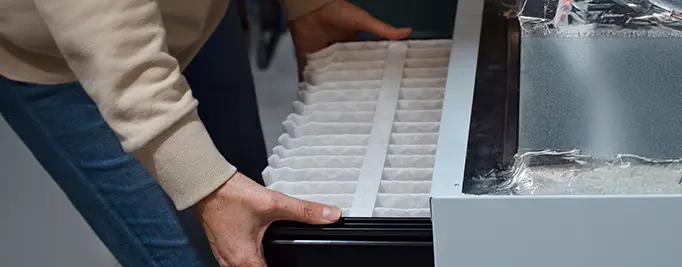Is your AC not keeping up with the heat? You’re not alone. During Central Indiana’s hottest summer days, many homeowners notice their air conditioner not keeping up with the thermostat or struggling to cool the home below 75 degrees. It’s frustrating, but it’s not always a sure sign that you need AC repairs.
If you’re wondering, “Why is my AC not keeping up with the thermostat?” or “Why won’t my AC cool below 75?”—we’ll explain what’s normal, what’s not, and when to call in a HVAC professional.

Why Is My AC Not Keeping Up on Hot Days?
Here’s something many homeowners don’t realize: air conditioning systems are sized for average summer conditions. During design and installation, most HVAC pros use something called a Manual J load calculation, which considers your home’s square footage, insulation, windows, and orientation to the sun to determine the right system size.
However, those calculations are based on historical climate data—meaning they’re designed to handle “typical” peak temps in your area, not the hottest afternoon of the year.
Most systems will cool your home to about 15 to 20 degrees below the outdoor temperature. So if it’s 95 outside, the system may only be able to bring your indoor temperature down to 75-80, even if your thermostat is set to 70. That doesn’t mean your air conditioner is failing. It could simply be working at full capacity and still not quite keeping up with the heat.
That said, persistent issues, especially when it’s not extremely hot, can be a sign that something deeper is wrong.
Common Reasons an Air Conditioner Is Not Keeping Up with the Heat
Here are some of the most common causes of poor performance when your AC is not cooling enough on hot days:
1. Air Filter Restrictions
A dirty filter reduces airflow and forces your system to work harder, which can lead to poor cooling performance or even breakdowns. But using the wrong type of filter can also cause problems. If you have a standard one-inch HVAC slot, avoid using HEPA filters, which can restrict airflow. Instead, choose a filter with an MERV rating between 8 and 13, depending on your system’s specifications.
2. Aging or Undersized Equipment
If your unit is more than 10 to 15 years old, or if it wasn’t sized properly for your home, it may not be powerful enough to handle peak cooling demands.
3. Heat Gain from Sun and Poor Insulation
Large, uncovered windows and poor attic insulation allow heat to enter your home faster than your AC can remove it, contributing to why the thermostat does not reach the set temperature.
4. Improper Thermostat Placement
If your thermostat is too close to a supply vent, it may be cooled faster than the rest of the home, causing the system to shut off early, even though other rooms haven’t reached the set temperature.
5. Low Refrigerant or Blocked Coils
An air conditioner not keeping up may be low on refrigerant due to a leak or may have blocked condenser coils that prevent proper heat exchange. Both reduce the system’s cooling power and efficiency.

Quick Fixes to Try Before You Call for Repairs
If your air conditioner is not keeping up with the thermostat, try these quick adjustments first. They might restore comfort without needing a service visit.
- Replace the air filter. As we mentioned previously, a dirty filter or the wrong filter type can reduce airflow and put a strain on your system.
- Check all windows and doors. Be sure all your windows and doors are shut and latched completely. You may be surprised how often a cracked open window or door has been the culprit in AC cooling issues.
- Clear the outdoor unit. Remove leaves, debris, and gently rinse the condenser coils to improve performance. With the unit’s power off, use a garden hose (never a power washer) to gently rinse the condenser coils and avoid damaging the fins.
- Keep sunlight out. Close blinds and curtains on sun-facing windows, especially in the afternoon.
- Use ceiling fans. They help rooms feel cooler and reduce the load on your AC.
- Aim for realistic thermostat settings. If it’s 95 out, 74-76 may be the most your system can reach.
If you’ve tried these and your AC still isn’t cooling below 75, or it can’t maintain comfort even at night, it’s probably time to call a technician.
Signs It’s Time to Call an HVAC Technician
Persistent issues that go beyond normal limitations may signal deeper problems. Call for professional service if you notice:
- Air is blowing, but it doesn’t seem cold enough. You should have around a 16- to 20-degree difference between the room temperature and supply vent air temperature.
- The AC runs constantly but never cools, even in the evening. On extremely hot days, it’s normal for your system to run more. But once the sun goes down and outdoor temperatures drop, your AC should start catching up.
- You hear rattling, squealing, or grinding noises. Your AC should operate quietly. Unusual sounds often mean loose components, worn belts, or failing motors—issues that you should address before they get worse.
- Ice is forming on the outdoor unit. Ice buildup usually points to low refrigerant, poor airflow, or restricted coils. Even a small amount of visible ice is a sign the system isn’t functioning properly. Shut it off to prevent further damage.
AC Not Keeping Up? Don’t Sweat It—Call Precision Comfort Systems
When your AC is not cooling enough on hot days, you don’t have to settle for sleepless nights and sweaty afternoons. At Precision Comfort Systems, we know how Indiana summers test the limits of your cooling system. Our certified technicians can quickly diagnose the issue and help you get back to comfort, whether it’s a simple fix or a system upgrade.
Need fast, local help? Call (317) 867-2665 or schedule service online today.
